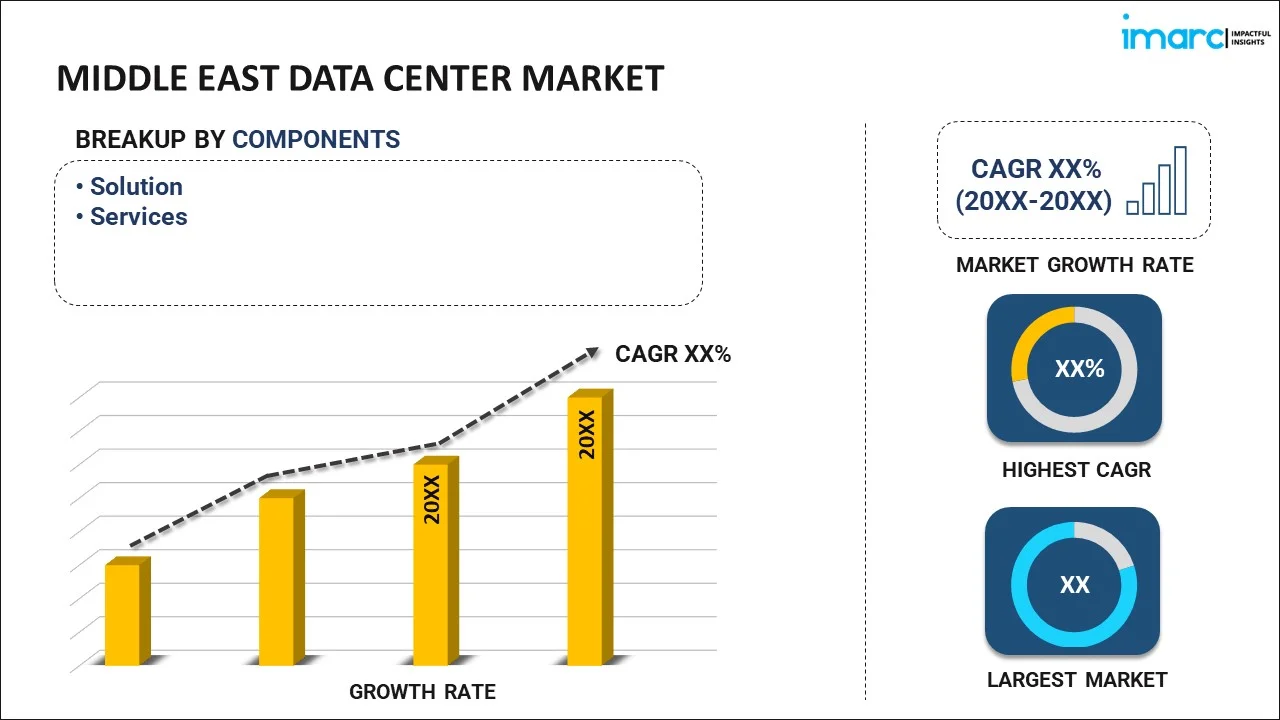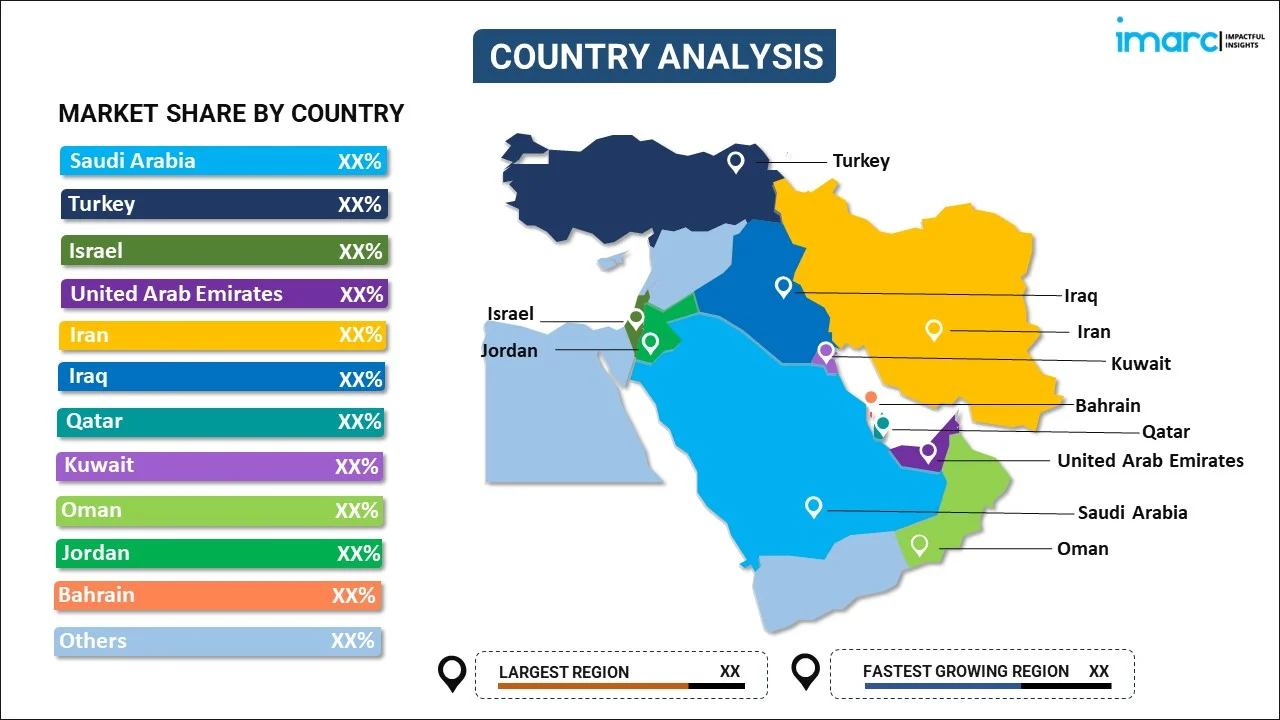
Middle East Data Center Market Report by Component (Solution, Services), Type (Colocation, Hyperscale, Edge, and Others), Enterprise Size (Large Enterprises, Small and Medium-sized Enterprises), End User (BFSI, IT and Telecom, Government, Energy and Utilities, and Others), and Country 2026-2034
Market Overview:
The Middle East data center market size reached USD 6,122.3 Million in 2025. Looking forward, IMARC Group expects the market to reach USD 19,290.5 Million by 2034, exhibiting a growth rate (CAGR) of 13.60% during 2026-2034. The rising digital transformation initiatives, increasing adoption of cloud services, and rapid deployment of 5G networks, leading to a heightened demand for advanced data processing and storage solutions, represent some of the key factors driving the market.
|
Report Attribute
|
Key Statistics
|
|---|---|
|
Base Year
|
2025
|
|
Forecast Years
|
2026-2034
|
|
Historical Years
|
2020-2025
|
|
Market Size in 2025
|
USD 6,122.3 Million |
|
Market Forecast in 2034
|
USD 19,290.5 Million |
| Market Growth Rate 2026-2034 | 13.60% |
Access the full market insights report Request Sample
A data center is a specialized facility designed to house and support a vast array of computing resources and components. These typically include servers, storage systems, networking hardware, and other related technology infrastructure. The main function of a data center is to securely store, manage, and disseminate data and applications vital for the operations of various organizations. Modern data centers are characterized by their robust connectivity, high-speed internet access, and redundancy in power and cooling systems, ensuring uninterrupted operations. They are engineered to provide high levels of security, both physical and digital, to protect sensitive data from unauthorized access and cyber threats. With rapid advancements in technology, data centers have evolved from traditional on-premises physical servers to more flexible configurations like cloud-based and virtualized environments. They find extensive applications across numerous sectors, including finance, healthcare, government, and technology, supporting critical operations and services. They serve as the backbone of the digital economy, enabling the processing and storage of immense volumes of data and powering essential applications from email and file sharing to complex data analytics and machine learning tasks. As a result, data centers are pivotal in driving innovation and supporting the ever-growing demands of the digital world due to their efficiency and scalability.
Middle East Data Center Market Trends:
The Middle East data center market is experiencing robust growth fueled by various factors, including the increasing demand for data storage and processing capabilities. This can be attributed to the expanding digital transformation across multiple sectors in the region. Apart from this, the rapid digitalization of businesses and governmental services represents another major growth-inducing factor. Additionally, with a growing emphasis on smart city initiatives, particularly in countries like the United Arab Emirates and Saudi Arabia, there is a heightened need for robust data infrastructure. These initiatives require substantial data processing and storage capabilities, which data centers provide. In line with this, the rising adoption of cloud services among Middle Eastern businesses, as they offer greater scalability and efficiency, is further contributing to the market growth. This shift necessitates the expansion of data center capacities to handle the increased load of cloud computing operations. Moreover, advancements in telecommunications, such as the deployment of 5G networks in the region, are accelerating the adoption of data centers as 5G technology requires dense networks with low-latency data processing, which data centers can support. Furthermore, the region is witnessing a rise in e-commerce and online services, thus catalyzing the demand for data centers. As more consumers turn to online platforms for shopping, entertainment, and services, businesses need to enhance their IT infrastructure to handle the growing online traffic and data storage needs. Along with this, a heightened focus on developing green data centers that utilize renewable energy sources and innovative cooling technologies to reduce carbon footprints, aligning with global environmental sustainability goals, is propelling market growth. Besides this, geopolitical stability and strategic location of the region that facilitates better service to both regional and global markets make the Middle East an attractive hub for multinational companies looking to establish data centers, thereby driving market growth.
Middle East Data Center Market Segmentation:
IMARC Group provides an analysis of the key trends in each segment of the market, along with forecasts at the regional and country levels for 2026-2034. Our report has categorized the market based on component, type, enterprise size, and end user.
Component Insights:

To get detailed segment analysis of this market Request Sample
- Solution
- Services
The report has provided a detailed breakup and analysis of the market based on the component. This includes solution and services.
Type Insights:
- Colocation
- Hyperscale
- Edge
- Others
A detailed breakup and analysis of the market based on the type have also been provided in the report. This includes colocation, hyperscale, edge, and others.
Enterprise Size Insights:
- Large Enterprises
- Small and Medium-sized Enterprises
The report has provided a detailed breakup and analysis of the market based on the enterprise size. This includes large enterprises and small and medium-sized enterprises.
End User Insights:
- BFSI
- IT and Telecom
- Government
- Energy and Utilities
- Others
A detailed breakup and analysis of the market based on the end user have also been provided in the report. This includes BFSI, IT and telecom, government, energy and utilities, and others.
Country Insights:

To get detailed regional analysis of this market Request Sample
- Saudi Arabia
- Turkey
- Israel
- United Arab Emirates
- Iran
- Iraq
- Qatar
- Kuwait
- Oman
- Jordan
- Bahrain
- Others
The report has also provided a comprehensive analysis of all the major regional markets, which include Saudi Arabia, Turkey, Israel, United Arab Emirates, Iran, Iraq, Qatar, Kuwait, Oman, Jordan, Bahrain, and Others.
Competitive Landscape:
The market research report has also provided a comprehensive analysis of the competitive landscape in the market. Competitive analysis such as market structure, key player positioning, top winning strategies, competitive dashboard, and company evaluation quadrant has been covered in the report. Also, detailed profiles of all major companies have been provided. Some of the key players include:
- Etisalat
- Gulf Data Hub
- Khazna Data Centers
- MEEZA
(Please note that this is only a partial list of the key players, and the complete list is provided in the report.)
Middle East Data Center Market Report Coverage:
| Report Features | Details |
|---|---|
| Base Year of the Analysis | 2025 |
| Historical Period | 2020-2025 |
| Forecast Period | 2026-2034 |
| Units | Million USD |
| Scope of the Report | Exploration of Historical and Forecast Trends, Industry Catalysts and Challenges, Segment-Wise Historical and Predictive Market Assessment:
|
| Components Covered | Solution, Services |
| Types Covered | Colocation, Hyperscale, Edge, Others |
| Enterprise Sizes Covered | Large Enterprises, Small and Medium-sized Enterprises |
| End Users Covered | BFSI, IT and Telecom, Government, Energy and Utilities, Others |
| Countries Covered | Saudi Arabia, Turkey, Israel, United Arab Emirates, Iran, Iraq, Qatar, Kuwait, Oman, Jordan, Bahrain, Others |
| Companies Covered | Etisalat, Gulf Data Hub, Khazna Data Centers, MEEZA, etc. |
| Customization Scope | 10% Free Customization |
| Post-Sale Analyst Support | 10-12 Weeks |
| Delivery Format | PDF and Excel through Email (We can also provide the editable version of the report in PPT/Word format on special request) |
Key Questions Answered in This Report:
- How has the Middle East data center market performed so far and how will it perform in the coming years?
- What is the breakup of the Middle East data center market on the basis of component?
- What is the breakup of the Middle East data center market on the basis of type?
- What is the breakup of the Middle East data center market on the basis of enterprise size?
- What is the breakup of the Middle East data center market on the basis of end user?
- What are the various stages in the value chain of the Middle East data center market?
- What are the key driving factors and challenges in the Middle East data center?
- What is the structure of the Middle East data center market and who are the key players?
- What is the degree of competition in the Middle East data center market?
Key Benefits for Stakeholders:
- IMARC’s industry report offers a comprehensive quantitative analysis of various market segments, historical and current market trends, market forecasts, and dynamics of the Middle East data center market from 2020-2034.
- The research report provides the latest information on the market drivers, challenges, and opportunities in the Middle East data center market.
- Porter's five forces analysis assist stakeholders in assessing the impact of new entrants, competitive rivalry, supplier power, buyer power, and the threat of substitution. It helps stakeholders to analyze the level of competition within the Middle East data center industry and its attractiveness.
- Competitive landscape allows stakeholders to understand their competitive environment and provides an insight into the current positions of key players in the market.
Need more help?
- Speak to our experienced analysts for insights on the current market scenarios.
- Include additional segments and countries to customize the report as per your requirement.
- Gain an unparalleled competitive advantage in your domain by understanding how to utilize the report and positively impacting your operations and revenue.
- For further assistance, please connect with our analysts.
 Request Customization
Request Customization
 Speak to an Analyst
Speak to an Analyst
 Request Brochure
Request Brochure
 Inquire Before Buying
Inquire Before Buying




.webp)




.webp)












